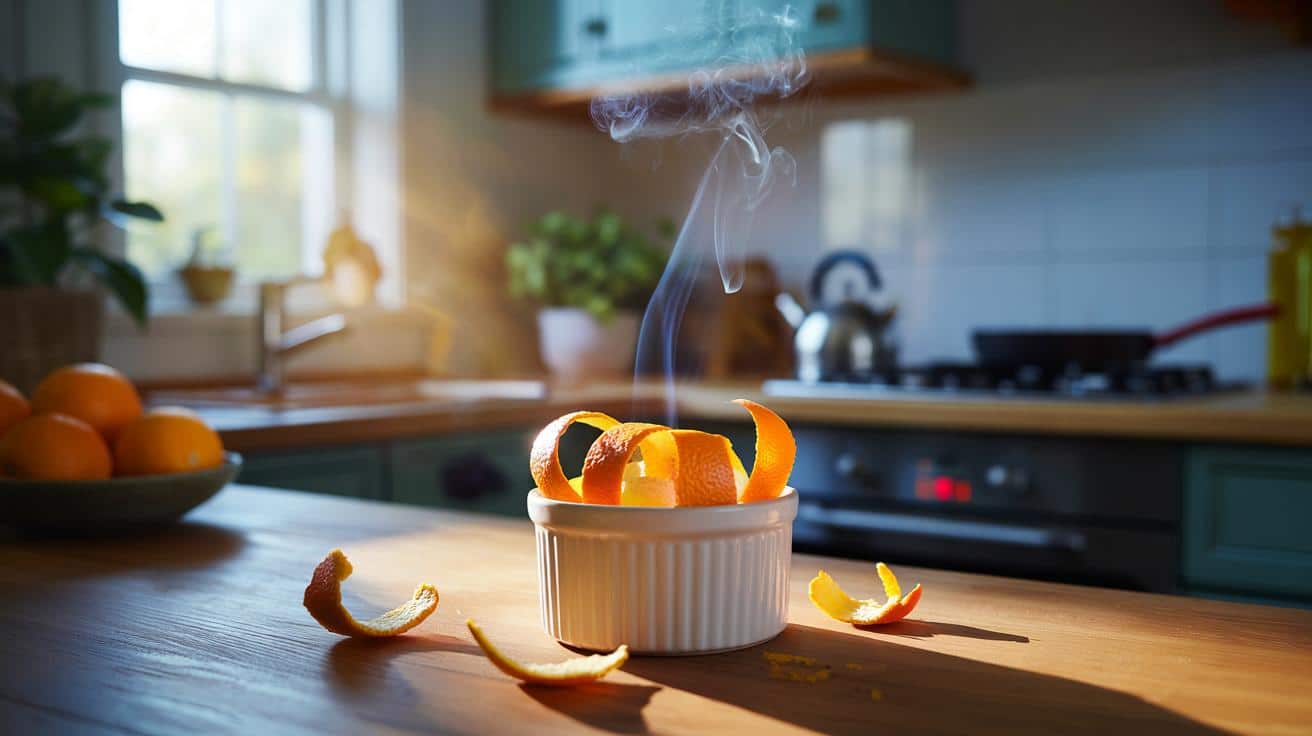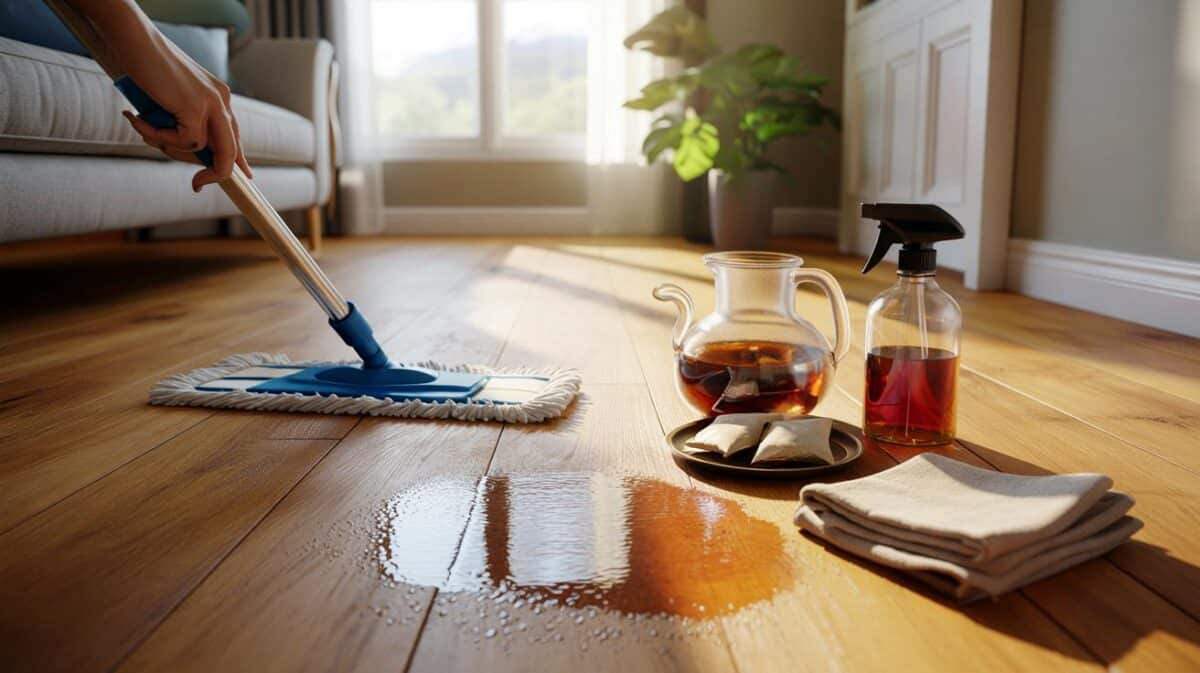We’re all searching for a cleaner, kinder way to make home air feel lighter. Now a small, surprising idea is making the rounds: burn orange peel. Scientists say the compounds released can neutralise stale odours and lift your mood. It’s cheap, simple, and hiding in your fruit bowl.
The first time I tried it, a January dusk slid across my kitchen window and made everything blue. I twisted the peel from a supermarket orange into ribbons, laid them in a heat-safe dish, and held a lighter just close enough to kiss the edges. A flicker. A crackle. Then that soft, sunny scent of zest blooming into the room like a memory of summer. I felt my shoulders drop. The kettle clicked in the background. The cat sniffed the air, unconvinced, then settled.
Five minutes later, the mood had changed. The air felt somehow brighter. A neighbour popped in to borrow sugar and said, “What’s that? Smells like a holiday.” The science agrees.
The quiet power of citrus smoke
Behind the cosy ritual is a very real chemical backbone. Orange peel contains monoterpenes, especially d‑limonene, a citrus compound known for its crisp, fresh aroma. When warmed or lightly singed, these volatile molecules evaporate into the air, where they can bind to lingering smells and change how we perceive indoor odours. That’s not magic. It’s chemistry meeting memory. Lemon, lime, and orange cues often signal “clean” in our brains, shaping mood before we even notice.
There’s data beyond the sensory story. Studies on ambient scent in public spaces have found that orange aroma can reduce anxiety and improve mood among people waiting in stressful settings like dental clinics. Research on limonene also points to antimicrobial activity in vapour form and on surfaces, suggesting a potential to curb certain airborne microbes in small spaces. Numbers vary by setup and concentration, and a kitchen is not a lab. The takeaway is simpler: citrus vapours appear to freshen the room and nudge the nervous system toward calm.
What’s actually happening? Heat loosens and releases the peel’s essential oils, letting terpenes disperse quickly. Those oils interact with volatile compounds already in your home, masking some smells and changing others. Some studies suggest limonene can lower perceived odour intensity by pairing with malodour molecules or shifting how receptors in the nose fire. The mood effect has two tracks: a direct pathway through olfactory receptors linked to emotional centres, and an indirect one via learned associations — kitchens, cleanliness, holidays, sunlight. It’s subtle. It adds up.
How to try it safely at home
Start simple. Save fresh peels from an orange, pat them dry, and cut into thumb‑length strips. Place them in a small, heavy, heat‑safe dish — a ramekin or cast‑iron spoon works — somewhere stable and away from curtains. Bring a match close until the very edge chars, then blow out any flame so you’re left with a gentle smoulder. You want a whisper of smoke and a puff of zest, not a bonfire. For a cleaner release, warm the peels on low in a dry pan for a few minutes and let the oils waft without charring. Both routes smell lovely. The second is kinder to sensitive lungs.
A few pointers make all the difference. Crack a window just a touch, especially in small kitchens or bedrooms. Keep peels dry — damp rinds sputter and smell bitter. If you have asthma, a simmer pot may suit you better than singeing. Pets deserve a mention: citrus oils can be irritating to cats and some dogs, so keep them out of the room and watch for any odd behaviour. Let’s be honest: nobody really does that every day. Try it when you air out the house, not during a Netflix binge on the sofa.
We’ve all had that moment when the house feels heavy after a long week and you want a quick reset that doesn’t come in a can. If that’s you, an orange peel ritual is a nice five‑minute mood lift — with a caveat or two.
“Limonene gives that unmistakable ‘clean’ note, and it does more than perfume the air. In controlled settings we see measurable effects on stress and odour perception,” says Dr. Elena Marks, environmental health researcher. “Just keep the flame modest and the room ventilated.”
- Best methods: light singe for aroma, low‑heat pan or oven‑dry for gentler diffusion.
- Fire safety: heat‑safe dish, stay nearby, extinguish fully, never on soft surfaces.
- When to skip: very small rooms, high ozone days near traffic, pets or people with respiratory issues present.
The bigger picture — and a tiny orange sun on your table
There’s a truth tucked inside this trend. We crave rituals that do double duty: clean the air a little, soothe the day a lot. Burning or warming citrus peel straddles that line, carrying both a minor deodorising effect and a psychological lift that feels larger than the effort. Some scientists point out a trade‑off when terpenes meet indoor ozone, which can form secondary particles, so gentle heat and a cracked window are a wise balance. *A simmering pot with orange, clove, and cinnamon is an even softer route if smoke makes you wary.* What’s striking is how ordinary it feels — not a gadget, not an app, just kitchen scraps and a match, turning the room almost golden. You smell it and think of sunlight. You breathe a little deeper. You might even smile without noticing.
| Key points | Detail | Interest for the reader |
|---|---|---|
| Orange peel releases limonene | Light heat volatilises citrus oils that neutralise odours and influence mood | A natural, low‑cost way to freshen rooms without synthetic sprays |
| Safe, simple methods work best | Use a heat‑safe dish, gentle singe or low dry heat, brief ventilation | Practical steps you can try today with what you already have |
| Mind the limits and trade‑offs | Smoke and terpenes can irritate some people and pets; low‑smoke methods help | Make a choice that suits your home, health, and comfort |
FAQ :
- Does burning orange peel actually clean the air?It can reduce stale odours and may lower some airborne microbes at close range, largely thanks to limonene vapours. Think of it as a gentle refresh, not a substitute for ventilation or HEPA filtration.
- Is it better to burn, toast, or simmer the peel?Toasting or simmering offers aroma with less smoke, which many people find easier on the lungs. A light singe brings a deeper, caramel‑zesty note but needs more care and airflow.
- What about safety for kids and pets?Keep flames supervised and brief. Citrus oils can irritate cats and some dogs, so keep them out of the room and avoid concentrated essential oil diffusers around animals.
- Will this remove cooking smells like fish or curry?It helps mask and shift the profile of lingering odours. Opening a window and wiping source surfaces will do more. The peel is the finishing touch, not the whole plan.
- Can I store peels for later?Yes. Dry them on a rack or in a low oven, then keep in a jar. Drier peels ignite and perfume more evenly, and they’re handy on a rainy evening when you want that lift.









